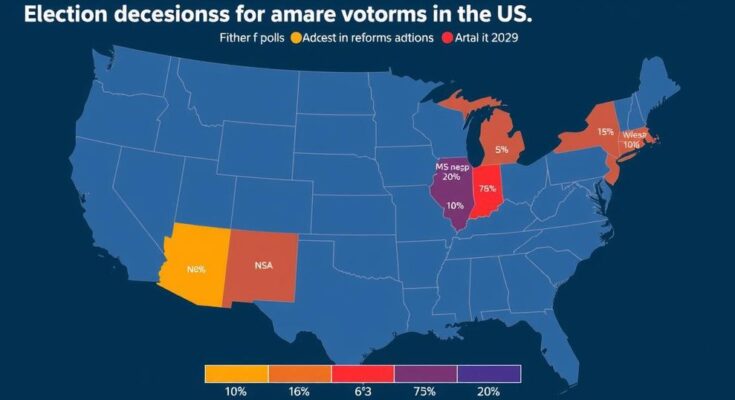Election reform initiatives faced widespread rejection across numerous states in the U.S., despite the mobilization of over $100 million in funding. Voters declined proposals for ranked choice voting and open primaries in multiple jurisdictions, reinforcing traditional voting methods. Advocates, concerned by the outcomes, must reconsider their strategies to better connect with and educate the electorate moving forward.
Election reform advocates faced a significant setback during the recent elections in the United States, as voters dismissed various state ballot initiatives aimed at transforming electoral processes. Despite a substantial investment exceeding $100 million, the movement saw minimal success across the board. John Opdycke, president of Open Primaries, succinctly noted, “It turns out, in retrospect, we weren’t yet ready for prime time.”
Voters in states including Arizona, Colorado, Idaho, Missouri, Montana, Nevada, Oregon, and South Dakota rejected proposals for ranked choice voting and open primaries, which collectively aimed to streamline the voting process by allowing broader candidate choices and facilitating more inclusive electoral participation. Open primaries would have enabled candidates from all political affiliations to appear on a single ballot, while ranked choice voting would allow voters to rank candidates in order of preference.
Despite substantial funding and prior successes, such as Alaska’s approval of similar measures, current trends indicate a reluctance among voters to shift from traditional election methods. Trent England, executive director of Save Our States, remarked, “While Americans are frustrated with politics, I think most Americans are just fine with the traditional way of voting.” In a disheartening turn for reform advocates, even in Alaska, attempts to repeal open primaries and ranked choice voting narrowly missed success, garnering 49.9% support.
While there have been isolated instances, such as successful implementations in specific jurisdictions like Portland, Oregon, and San Francisco, broader acceptance remains tentative. Larry Jacobs, a professor of politics, raised concerns about the effectiveness of ranked choice voting, suggesting that it may not substantially alleviate political division or negativity in campaigning.
Considering these challenges, reform groups must now reevaluate their strategies, potentially breaking initiatives into smaller, more manageable components that resonate better with the electorate. Opdycke expressed this sentiment, stating, “I think there’s a deeper appreciation for the kind of brick work, foundation-building, conversation creation that has to go on as a precursor of launching a formal campaign.”
The recent electoral outcomes highlight the complexities and challenges facing election reform initiatives in the United States. Advocates had anticipated a favorable reception for measures such as ranked choice voting and open primaries but encountered significant voter resistance instead. Despite considerable financial backing and ongoing efforts to promote these alternative electoral systems, the results suggest a need for deeper engagement and understanding among the electorate to overcome ingrained preferences for traditional voting methods.
The recent referendum results illustrate a clear resistance among voters toward significant electoral reforms, despite extensive financial investments and prior successful implementations in select regions. Advocacy groups face the daunting task of re-evaluating their approaches and strategies, emphasizing grassroots support and community engagement to foster a deeper understanding of the proposed reforms. In light of voter sentiment, it is evident that any future efforts in this arena will require careful consideration and incremental strategies that resonate with the electorate.
Original Source: www.independent.co.uk




